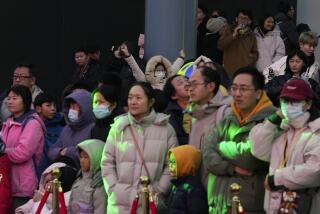China’s elderly to grow into a crisis
- Share via
SHANGHAI — For three decades China’s one-child policy helped power this nation’s economic rise. With fewer mouths to feed, families saved. Poverty fell. Living standards improved.
But a social experiment that worked well in some respects is now threatening the country’s hard-won gains. China’s working-age population -- the engine behind its prolific growth -- will start shrinking within a few years.
Meanwhile, the ranks of elderly are projected to soar. By the middle of this century, fully a third of China’s population will be age 60 or older, compared with 26% in the United States. China’s projected 438 million senior citizens will outnumber the entire U.S. population.
With fewer workers to support an aging society in need of care, China faces the same demographic squeeze confronting Western nations. The difference: China’s family-tinkering policy has accelerated a shift that the country is ill-prepared to manage and finance.
“The problem is the age wave is coming while China is still relatively poor,” said Richard Jackson of the Washington-based Center for Strategic and International Studies. “China may be the first major country to grow old before it grows rich.”
The challenge is profound.
Advances in family planning, nutrition and healthcare have resulted in longer life spans and fewer babies across much of the globe. The populations of developing regions such as Latin America and Asia are still much younger than those of U.S. and European societies. But they’re aging much more quickly, lacking the time and resources to stitch together old-age social safety nets on par with those of rich, industrialized nations.
Shanghai provides a window into China’s demographic future. Already China’s largest city, it’s also its grayest. More than one-fifth of its population is at least 60 years old. That percentage is projected to nearly double to 40% by 2030.
Seniors crowd public parks to do tai chi exercises in the morning and play checkers in the afternoon. They natter with one another on city buses, where everyone 70 and older rides free of charge.
So many residents have reached retirement age that city officials are urging local companies to persuade their aging staffs to stay on the job longer. The government has injected $618 million into the public pension system over the last two years to keep it solvent.
Lu Yiwen, a 45-year-old factory technician in Shanghai, is years away from retirement. But she’s already anxious about her dotage.
“I’m not sure what we’re going to do when my husband and I get old,” she said. “We have one son and we just hope he can take care of us. Maybe he’ll have his own business. But it’s a lot of pressure for one child.”
Despite its dazzling economic growth, China is still a low-income country. Its per-capita GDP in 2008 was just over $5,000, one-ninth that of the United States. Only about a third of China’s workforce is covered by a pension system; most of those covered are urbanites. Families save copiously, but it’s rarely enough to support them through old age. Average life expectancy is 73 years -- up a stunning 32 years since the People’s Republic was founded in 1949.
For most Chinese, social security still means relying on extended family. But that bond is being strained by low birthrates and the migration of tens of millions of young people from the country to jobs in far-off manufacturing plants.
When the retirement center at 2 Ruijin Road opened 15 years ago, the thought of packing loved ones off to an old-age facility was still taboo.
“If you sent your parents to a home, people would accuse you of treating them badly,” said Li Hong Mei, the center’s chief physician. “Parents would just refuse to go.”
Today, Li regularly turns the elderly away. The 60-bed center is often filled to capacity.
To ward off social catastrophe, China’s central government has pledged to introduce a national pension system. The challenge will be crafting a plan that’s generous enough to keep seniors from poverty but doesn’t unduly burden the young. Today in China there are 5.4 working-age adults for every elderly person, according to the Center for Strategic and International Studies. That ratio will plummet to 2.5 by 2030 and to 1.6 by 2050.
“Other than lifting the one-child family policy or allowing immigration, there’s not much they can do about demographic realities,” said Susan Shirk, a professor at UC San Diego and author of “China: Fragile Superpower.”
Introduced in 1979 by China’s paramount leader Deng Xiaoping, China’s one-child policy aimed to slow the nation’s population growth and boost living standards. The rules apply mainly to married, urban couples, with exemptions for ethnic minorities and rural residents. The policy is estimated to have prevented between 300 million and 400 million births to date.
From the beginning the program was controversial, criticized for boosting abortions, sterilizations and infanticide. It is also blamed for China’s gender gap. The cultural preference for boys has resulted in 32 million more males than females under the age of 20, according to one study.
China’s fertility rate now averages 1.8, less than replacement. Falling fertility is common as countries become more prosperous; China’s rate has been declining for decades. But there’s no question that the one-child policy reduced fertility faster and sooner, a process some have dubbed “premature aging.”
Still, lifting the one-child rule probably wouldn’t result in a population surge, experts said. Chinese have become accustomed to having smaller families and enjoying a bit more disposable income.
“The momentum makes the problem difficult to see,” said Baochang Gu, a demographer at Renmin University of China. “It creates an illusion that we won’t need to do anything. But it may be too late.”
China’s shrinking working-age population is projected to shave 0.7 percentage points annually off China’s GDP starting in 2030. But the sick and aged will require an increasing share of resources.
Bachelor Zhu Zi Ran moved into the Ruijin Road retirement facility six months ago after he suffered a blood clot in his brain. The diminutive man in oversized Harry Caray-style glasses said he felt lucky to be there considering how few beds were available. He spends about $200 out of his $250 monthly pension to stay at the retirement home.
“I have to save the rest because my health is not good,” Zhu, 67, said. “The only thing I spend money on is cigarettes. I’m not that addicted, so I only smoke half a pack a day.”
The fate of seniors from the countryside is even more precarious. Xu Gang Kai, a 60-year-old native of central China’s Henan province, was told he was too healthy to be admitted to his village retirement home. So he left for Beijing a year ago to find work.
Xu said he could not count on his only child for help.
“I’ve got nothing back home,” he said. “No land, no housing, no plans.”
--
Cao Jun and Nicole Liu in Beijing contributed to this report.
More to Read
Sign up for Essential California
The most important California stories and recommendations in your inbox every morning.
You may occasionally receive promotional content from the Los Angeles Times.











